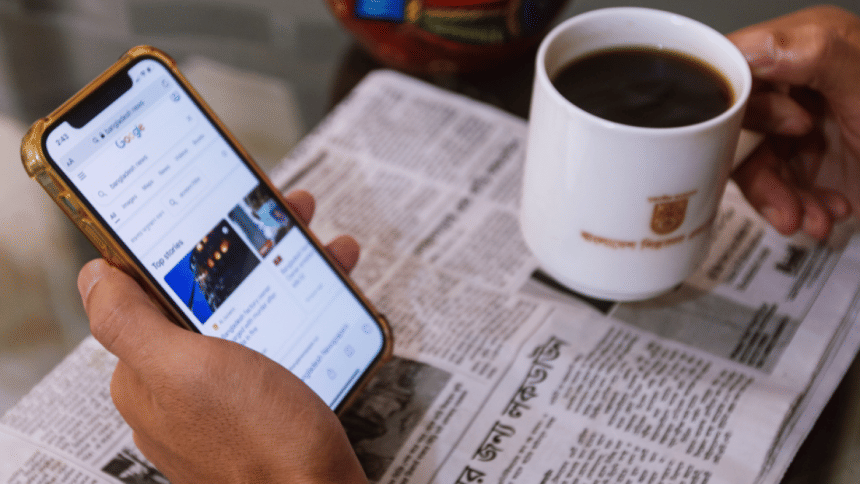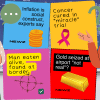The right way to consume news

When a few friends and I took up high school debating a couple of years ago, we were scared. But it wasn't the cutthroat competition or public speaking that we were most afraid of, it was the possibility of being perceived as ignorant or underprepared, given that there is no limit to the range of topics debate motions can cover. Having shared our worries with our coaches and experienced debaters, we were told that to compete, we must consume as much news and information as we had access to.
It didn't take long for the combination of fear, ambition, and access to unlimited amounts of content on the internet to become counterproductive and overwhelm us.
Such advice is hardly exclusive to debaters, throughout high school and university we all hear the importance of keeping up on new and current affairs being emphasised over and over by teachers, guidance counselors, motivational speakers on social media, and literally anyone I can think of.
The problem is that when we are told to read up and research, we aren't told how.
While young people do not have the same unquestioning faith in WhatsApp chat threads as their parents, and generally tend to be more tech-savvy, they still aren't completely immune to the dangers of misinformed news consumption. Knowing about the nature of how news outlets operate, how news is circulated online, and the why and how of taking in news from varied sources and perspectives can make the process of news consumption more enjoyable and productive.
We all know that not everything we see on the internet is true; misinformation is often subtler than we think. Besides completely untrue stories, which are usually easy to identify, misinformation is also heavily biased propaganda, digitally-altered images or video, or satire believed to be true.
This problem can be combated with the simple solutions of going beyond the headline, being aware of whether you're reading a news report, an opinion piece, or a sponsored post, and checking if all the sources of the same news story report basic facts that match.
Zyma Islam, journalist and reporter at The Daily Star, says, "The main thing when it comes to understanding whether or not a news article should be trusted is determining its sourcing. Almost all sentences must include a citation, either from a person or a report or data source. If an article is making generic statements without saying where they got their information from, run ten miles away from it.
"Also, it is alright for news articles to pick a side or have an opinion but it must be an educated bias, and the bias must only exist when there is a clear moral or ethical right or wrong. That being said, even if there is a bias, the article must make a clear effort to reach out to the opposing POV as a part of the right-to-reply exercise."
It's also possible to be misled by the reporting of facts that are completely true. To avoid that, we need to be aware of the fact that the process of reporting news itself has its limitations. All news outlets, including reputed international news ones, have their own specific biases, such as which political party it endorses. Therefore, it's important to know what comes out of a certain medium. The way a story is told is almost always unintentionally affected by the reporter's personal bias. It is also affected by the time when it is told since all news reports are far from the whole story and only a snapshot in time.
"Local news outlets, the ones that are credible and pursue ethical journalism any way, operate under a lot of pressure," says Karim Al Waheed, Digital Editor of The Daily Star. "The Covid-19 pandemic has only made it worse."
According to a former president of the Bangladesh Debate Council, it's important to take into account incentives and leverage when relying on and sharing news that is circulated online.
"Clickbait headlines are meant to generate shock value and provoke a reaction; while it's only natural to react accordingly, it helps to take a minute to reflect and remember that many such creators need engagement numbers and clicks. Knowing this helps us understand why a headline came about; it's not the full news, which should be read before we click the share button," he comments.
Where you're getting your news from is one of the most important factors controlling what information you're consuming and its influence on you.
"Social media algorithms are designed to put the content we prefer in front of us first," said Sadid Murshed, debate coach at Scholastica Debating Society and former debate coach at Jahangirnagar University Debate Organization, as he shared how this isn't the most ideal for our exposure to news. "The more time we spend in this 'echo chamber' of information filtered according to our identity and pre-existing beliefs, the more disconnected to alternate views we become."
"Read different versions of the same thing," advices Zyma Islam. "Read all types of media – the top tier ones, the mid-tier ones, the ones you've never heard of. Follow the discussions on those topics happening on Twitter or Facebook. Identify who are the people having these conversations and identify their leanings."

Karim Al Waheed advises us not to stay stuck in the 'social media bubbles created by algorithms.'
"Seek out news, views and other content you won't necessarily find on your news feed," he says.
Productive news consumption should occur in a way that our views are constantly challenged. While it not the most ideal, it's still possible to achieve this while consuming news on social media.
"To mitigate the disconnect, be explicitly aware of the biases of the news sources that you follow. Intentionally expose yourself to counter-narratives. For example, if you generally hold liberal views, seek out and follow news outlets that cater to a conservative viewpoint. This way you'll be forming constructive, informed opinions that have been weighed against alternatives and been put into an intellectual test," Sadid added.
It's also helpful to examine our own biases and assumptions, since humans have a tendency of trusting information that confirms our own biases. When reading up on current affairs or researching a certain news story, it's much better to use a search engine like DuckDuckGo that does not personalise search results.
All this emphasis on cross-referencing and researching across various outlets may make it seem like the more news we read, the better. That's not always the case. Daily exposure to too much news can be counterproductive.
Constant exposure to a large number of news reports, opinions, and analyses may negatively impact our ability to formulate our own opinions and perspectives, instead, we may become convinced and regurgitate whatever popular opinion and its justification is. This is a considerable impairment to our individual creativity and critical thinking abilities.
Again, Sadid advocates for not making social media our primary source of news, "Social media generally pumps a lot of low-quality content in high volume, most of which you did not want to see anyways. Be an intentional consumer. Find out what information is relevant to or interests you, and actively look for that. That way you can be conscious of what sources you pick, and the risk of going overboard on information is minimised."
Instead of trying to gain surface level knowledge on a wide variety of topics, or trying to keep up with as much breaking news and news stories as possible, the process is a lot more enjoyable when you find out what kind of news really interests you, and dig deeper on news that is relevant to your field of work or study. But when you want to share or know more about a story that is impactful or important to you, be sure to cross-reference.
A good strategy to prevent information overload can be to keep your social media use and news consumption separate. This way, you're not looking at news whenever you're communicating with your friends, aren't suddenly bombarded with unfavourable news, or just simply too much information. Set aside a certain time of the day when you sit down and read news, from whatever your preferred outlet is.
Despite what the prevalent "woke" culture says, you really do not need to know about everything that is going on. If constant exposure to grim news upsets you or adversely affects your mental health, it's not worth it. Even if it might not seem like it, with a little awareness and tweaking of your social media feeds, you are in control of what you see, and you are the one who gets to choose.
Amrin Tasnim Rafa is always confused, it's literally her dominant personality trait. This is maybe her email, she can't be sure: [email protected]
Read more youth content on SHOUT.

 For all latest news, follow The Daily Star's Google News channel.
For all latest news, follow The Daily Star's Google News channel. 








Comments